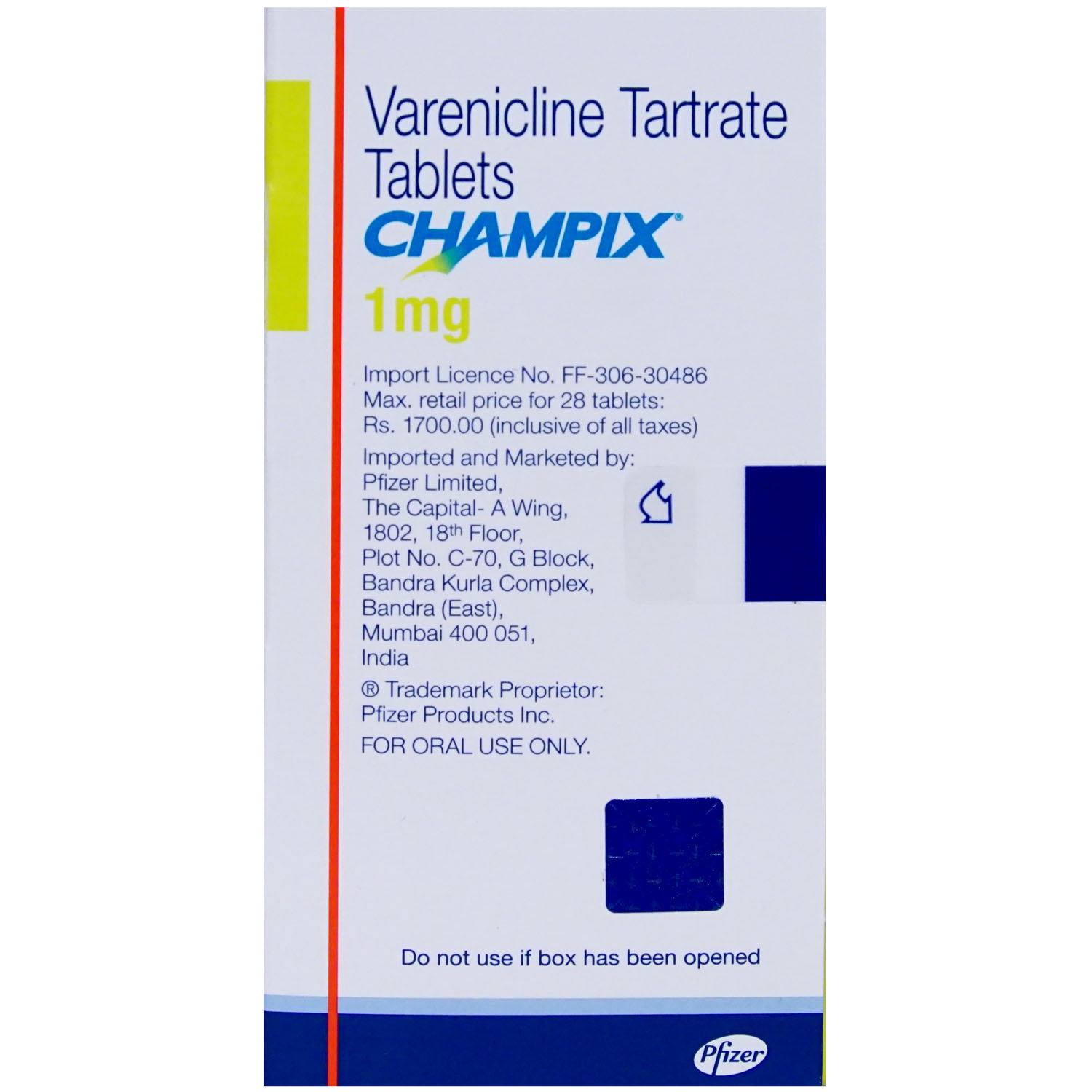Varenicline
About Varenicline
Varenicline belongs to the class of 'smoking cessation aids,' primarily used to treat nicotine addiction. Nicotine is an addictive chemical found in the tobacco plant. It produces pleasing effects on the brain when a person smokes a cigarette. Though the effect is temporary, it leads to the compulsive craving for one more cigarette. This continuous process of wanting to smoke despite a strong will to quit smoking is known as nicotine addiction/nicotine dependence.
Varenicline contains 'Varenicline,' which belongs to the class of 'nicotinic agonists. It blocks the effects of nicotine by acting on the nicotinic receptors in the central nervous system. Varenicline helps in reducing the craving and withdrawal symptoms that occur after quitting smoking. It decreases the sense of satisfaction or enjoyment that occurs while smoking, thereby helping adults quit smoking.
Your doctor will advise the dose and duration to take Varenicline based on your condition. The common side effects of Varenicline include nausea, headache, vomiting, drowsiness, gas, constipation, trouble sleeping or insomnia, unusual dreams, and taste changes. Most of these side effects of Varenicline do not require medical attention and gradually resolve over time. However, if the side effects are persistent, please seek medical help.
Try not to stop taking this medicine of your own. Brief your medical history if you have any heart, liver, kidney diseases, seizure (fits), mood disorders, and alcoholism before taking Varenicline. Please inform your doctor if you are pregnant or currently breastfeeding before taking Varenicline. Do not drive or operate machinery while using Varenicline since it can cause sleepiness and dizziness. Avoid drinking alcohol while taking Varenicline as it can worsen your dizziness. Varenicline is not recommended for use in patients younger than 18 years of age.
Uses of Varenicline
Medicinal Benefits
Varenicline works as an aid in curing a nicotine addiction. It contains 'Varenicline,' which is a smoking cessation aid. It is a nicotinic agonist and blocks nicotine's effects by acting on the nicotinic receptors in the central nervous system. Varenicline reduces the craving and withdrawal symptoms that occur after quitting smoking and during the treatment. It also decreases the sense of satisfaction or enjoyment that occurs while smoking, thereby helping adults quit smoking. It is advised to provide the patients who are striving to quit smoking with proper emotional support and educational material while undergoing treatment with Varenicline.
Directions for Use
Storage
Side Effects of Varenicline
- Nausea
- Headache
- Vomiting
- Drowsiness
- Gas
- Constipation
- Trouble sleeping or insomnia
- Unusual dreams
- Changes in taste
Drug Warnings
Inform your doctor if you have any liver, kidney diseases, mood disorders (depression, schizophrenia, bipolar disorder), heart diseases (coronary artery disease, stroke), fits, blood vessel disorders (peripheral vascular disease), alcoholism, and drug abuse before taking. Neuropsychiatric events like depression, delusions, hallucinations, aggression, suicidal thoughts, and suicidal attempts are reported in patients using Varenicline. If you experience any mood changes, please stop taking Varenicline and consult your doctor immediately. Also, let your doctor know if you are pregnant or a lactating mother before starting Varenicline. Do not drive or operate machinery if you experience dizziness and sleepiness while using Varenicline. Drinking alcohol can worsen your side effects like dizziness and drowsiness when you are treated with Varenicline; hence please avoid alcohol consumption. Varenicline is not recommended in patients younger than 18 years of age.
Drug Interactions
Drug-Drug Interaction: Varenicline may interact with antidiabetics (insulin), blood thinners (warfarin), anti-ulcers (cimetidine), HIV/AIDS drugs (dolutegravir), chest pain medicines (ranolazine), anti-cancers (vandetanib), and respiratory drugs (theophylline).
Drug-Food Interaction: Avoid alcohol intake since it may worsen the side effects like dizziness and drowsiness.
Drug-Disease Interaction: Varenicline is to be cautiously used in liver, kidney diseases, mood disorders (depression, schizophrenia, bipolar disorder), heart diseases (coronary artery disease, stroke), fits, blood vessel disorders (peripheral vascular disease), alcoholism, and drug abuse.
Drug-Drug Interactions Checker List:
Safety Advice

Alcohol
unsafeAvoid drinking alcohol while taking Varenicline as it can worsen your side effects like dizziness and drowsiness.

Pregnancy
cautionVarenicline is a pregnancy category C drug. Animal studies of Varenicline during pregnancy showed harmful effects on developing baby. Please consult your doctor if you are planning to become pregnant or already pregnant before starting Varenicline.

Breast Feeding
cautionThere is limited data on how Varenicline affects breastfeeding. However, using Varenicline while breastfeeding may make the breastfed infant vomit or develop a seizure/fits. It is advised to decide on discontinuing Varenicline or discontinuing breastfeeding. Please consult your doctor for more information.

Driving
unsafeDo not drive or operate machinery if you experience dizziness and drowsiness while using Varenicline.

Liver
cautionVarenicline should be used with caution in patients with liver diseases. Let your doctor know if you have any history of liver diseases or hepatic impairment. Your doctor will weigh the benefits and potential risks before prescribing Varenicline.

Kidney
cautionVarenicline should be used with caution in patients with kidney diseases. Let your doctor know if you have any history of kidney diseases. Your doctor will weigh the benefits and potential risks before prescribing Varenicline.

Children
unsafeVarenicline is not recommended in children or adolescents younger than 18 years of age.
Habit Forming
Diet & Lifestyle Advise
- Do not worry about the cravings of smoking you need to hold up in the next few weeks of course. Take it one step at a time.
- You can get a hold of your cravings by keeping your mouth busy with a piece of gum or candy.
- Your doctor may also suggest nicotine replacement therapy. You can try gums, lozenges, or patches.
- Avoid triggers that make you crave a cigarette. These include alcohol, caffeine and people who smoke nearby.
- You can also try going to non-smoking public areas to divert your mind.
- Go for a walk in nature for a quick exercise.
- If you feel like giving up, remember why you started and what made you try this hard to quit smoking.
- Lastly, accept yourself and embrace your family support in encouraging you to quit smoking.
Special Advise
- Close monitoring of renal function is advised in renal failure or kidney disease patients.
- Keep a check on your heart condition (if you are a heart disease patient) with an electrocardiogram (ECG).
- It is recommended to take advice from a mental health doctor if you notice any mood changes and suicidal thoughts while using Varenicline.
Patients Concern
Disease/Condition Glossary
Nicotine addiction: Nicotine is an addictive chemical found in the tobacco plant. It produces pleasing effects on the brain when a person smokes a cigarette. This effect is temporary, but it leads to the compulsive craving for one more cigarette. This continuous process of wanting to smoke despite a strong will to quit smoking is known as nicotine addiction/nicotine dependence. Symptoms include frequently failing to stop smoking, giving up social gatherings to smoke, and withdrawal symptoms when trying to quit smoking. Starting to smoke at a young age (18 years) is also a primary reason for nicotine addiction. Anyone with a history of alcoholism or drug abuse is at an increased risk of developing a nicotine addiction.
FAQs
Varenicline contains Varenicline, a smoking cessation aid. Varenicline helps to cure nicotine addiction by decreasing the sense of pleasure you get while smoking and blocks the effect of nicotine chemical by acting on the brain.
You could undergo nicotine replacement therapy while using Varenicline only if the doctor advised you to do so. However, using a nicotine patch or other forms of NRT while being treated with Varenicline may cause undesired effects. If you experience any worsening of side effects, it is advised to continue one therapy after another or do as prescribed by the doctor.
Varenicline should be cautiously used only under a doctor's supervision if you have any liver, kidney diseases, mood disorders (depression, schizophrenia, bipolar disorder), heart diseases (coronary artery disease, stroke), fits, blood vessel disorders (peripheral vascular disease), alcoholism, and drug abuse.
Take the missed dose as soon as possible. However, if it is time for the next dose, skip the missed dose and go back to your regular dosing schedule. Do not double the dose.
Neuropsychiatric events like depression, delusions, hallucinations, aggression, suicidal thoughts, and suicidal attempts are reported in patients using Varenicline. If you experience any mood changes, agitation or depression, please stop taking Varenicline and consult your doctor immediately.
The occurrence of seizures is reported in patients with a seizure disorder while using Varenicline. Hence Varenicline is cautiously recommended for use, and close monitoring is required in patients with a history of seizures/fits disorder during the course.
You may experience withdrawal symptoms with or without the usage of Varenicline. Hence, it is advised to closely monitor for any symptoms like increased appetite, weight gain, trouble sleeping, slower heart rate, anxiety, restlessness, and urge to smoke. If you experience any withdrawal symptoms, please seek medical help immediately.





